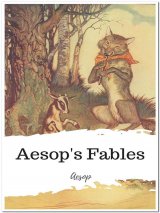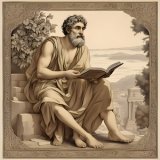Aesop's Fables Page #21
Aesop's Fables, or the Aesopica, is a collection of fables credited to Aesop, a slave and storyteller believed to have lived in ancient Greece between 620 and 564 BCE.
THE ASS AND THE DOG An Ass and a Dog were on their travels together, and, as they went along, they found a sealed packet lying on the ground. The Ass picked it up, broke the seal, and found it contained some writing, which he proceeded to read out aloud to the Dog. As he read on it turned out to be all about grass and barley and hay--in short, all the kinds of fodder that Asses are fond of. The Dog was a good deal bored with listening to all this, till at last his impatience got the better of him, and he cried, "Just skip a few pages, friend, and see if there isn't something about meat and bones." The Ass glanced all through the packet, but found nothing of the sort, and said so. Then the Dog said in disgust, "Oh, throw it away, do: what's the good of a thing like that?" THE ASS CARRYING THE IMAGE A certain man put an Image on the back of his Ass to take it to one of the temples of the town. As they went along the road all the people they met uncovered and bowed their heads out of reverence for the Image; but the Ass thought they were doing it out of respect for himself, and began to give himself airs accordingly. At last he became so conceited that he imagined he could do as he liked, and, by way of protest against the load he was carrying, he came to a full stop and flatly declined to proceed any further. His driver, finding him so obstinate, hit him hard and long with his stick, saying the while, "Oh, you dunder-headed idiot, do you suppose it's come to this, that men pay worship to an Ass?" Rude shocks await those who take to themselves the credit that is due to others. THE ATHENIAN AND THE THEBAN An Athenian and a Theban were on the road together, and passed the time in conversation, as is the way of travellers. After discussing a variety of subjects they began to talk about heroes, a topic that tends to be more fertile than edifying. Each of them was lavish in his praises of the heroes of his own city, until eventually the Theban asserted that Hercules was the greatest hero who had ever lived on earth, and now occupied a foremost place among the gods; while the Athenian insisted that Theseus was far superior, for his fortune had been in every way supremely blessed, whereas Hercules had at one time been forced to act as a servant. And he gained his point, for he was a very glib fellow, like all Athenians; so that the Theban, who was no match for him in talking, cried at last in some disgust, "All right, have your way; I only hope that, when our heroes are angry with us, Athens may suffer from the anger of Hercules, and Thebes only from that of Theseus." THE GOATHERD AND THE GOAT A Goatherd was one day gathering his flock to return to the fold, when one of his goats strayed and refused to join the rest. He tried for a long time to get her to return by calling and whistling to her, but the Goat took no notice of him at all; so at last he threw a stone at her and broke one of her horns. In dismay, he begged her not to tell his master: but she replied, "You silly fellow, my horn would cry aloud even if I held my tongue." It's no use trying to hide what can't be hidden. THE SHEEP AND THE DOG Once upon a time the Sheep complained to the shepherd about the difference in his treatment of themselves and his Dog. "Your conduct," said they, "is very strange and, we think, very unfair. We provide you with wool and lambs and milk and you give us nothing but grass, and even that we have to find for ourselves: but you get nothing at all from the Dog, and yet you feed him with tit-bits from your own table." Their remarks were overheard by the Dog, who spoke up at once and said, "Yes, and quite right, too: where would you be if it wasn't for me? Thieves would steal you! Wolves would eat you! Indeed, if I didn't keep constant watch over you, you would be too terrified even to graze!" The Sheep were obliged to acknowledge that he spoke the truth, and never again made a grievance of the regard in which he was held by his master. THE SHEPHERD AND THE WOLF A Shepherd found a Wolf's Cub straying in the pastures, and took him home and reared him along with his dogs. When the Cub grew to his full size, if ever a wolf stole a sheep from the flock, he used to join the dogs in hunting him down. It sometimes happened that the dogs failed to come up with the thief, and, abandoning the pursuit, returned home. The Wolf would on such occasions continue the chase by himself, and when he overtook the culprit, would stop and share the feast with him, and then return to the Shepherd. But if some time passed without a sheep being carried off by the wolves, he would steal one himself and share his plunder with the dogs. The Shepherd's suspicions were aroused, and one day he caught him in the act; and, fastening a rope round his neck, hung him on the nearest tree. What's bred in the bone is sure to come out in the flesh. THE LION, JUPITER, AND THE ELEPHANT The Lion, for all his size and strength, and his sharp teeth and claws, is a coward in one thing: he can't bear the sound of a cock crowing, and runs away whenever he hears it. He complained bitterly to Jupiter for making him like that; but Jupiter said it wasn't his fault: he had done the best he could for him, and, considering this was his only failing, he ought to be well content. The Lion, however, wouldn't be comforted, and was so ashamed of his timidity that he wished he might die. In this state of mind, he met the Elephant and had a talk with him. He noticed that the great beast cocked up his ears all the time, as if he were listening for something, and he asked him why he did so. Just then a gnat came humming by, and the Elephant said, "Do you see that wretched little buzzing insect? I'm terribly afraid of its getting into my ear: if it once gets in, I'm dead and done for." The Lion's spirits rose at once when he heard this: "For," he said to himself, "if the Elephant, huge as he is, is afraid of a gnat, I needn't be so much ashamed of being afraid of a cock, who is ten thousand times bigger than a gnat."
Translation
Translate and read this book in other languages:
Select another language:
- - Select -
- 简体中文 (Chinese - Simplified)
- 繁體中文 (Chinese - Traditional)
- Español (Spanish)
- Esperanto (Esperanto)
- 日本語 (Japanese)
- Português (Portuguese)
- Deutsch (German)
- العربية (Arabic)
- Français (French)
- Русский (Russian)
- ಕನ್ನಡ (Kannada)
- 한국어 (Korean)
- עברית (Hebrew)
- Gaeilge (Irish)
- Українська (Ukrainian)
- اردو (Urdu)
- Magyar (Hungarian)
- मानक हिन्दी (Hindi)
- Indonesia (Indonesian)
- Italiano (Italian)
- தமிழ் (Tamil)
- Türkçe (Turkish)
- తెలుగు (Telugu)
- ภาษาไทย (Thai)
- Tiếng Việt (Vietnamese)
- Čeština (Czech)
- Polski (Polish)
- Bahasa Indonesia (Indonesian)
- Românește (Romanian)
- Nederlands (Dutch)
- Ελληνικά (Greek)
- Latinum (Latin)
- Svenska (Swedish)
- Dansk (Danish)
- Suomi (Finnish)
- فارسی (Persian)
- ייִדיש (Yiddish)
- հայերեն (Armenian)
- Norsk (Norwegian)
- English (English)
Citation
Use the citation below to add this book to your bibliography:
Style:MLAChicagoAPA
"Aesop's Fables Books." Literature.com. STANDS4 LLC, 2025. Web. 11 Jan. 2025. <https://www.literature.com/book/aesop%27s_fables_316>.




Discuss this Aesop's Fables book with the community:
Report Comment
We're doing our best to make sure our content is useful, accurate and safe.
If by any chance you spot an inappropriate comment while navigating through our website please use this form to let us know, and we'll take care of it shortly.
Attachment
You need to be logged in to favorite.
Log In